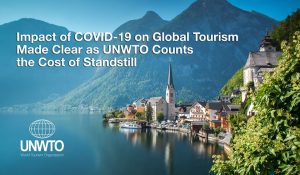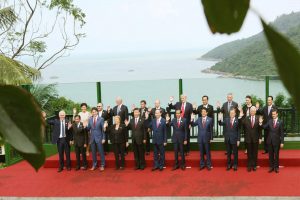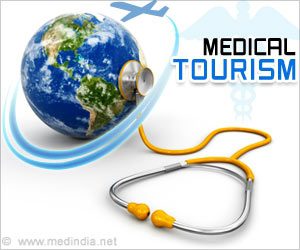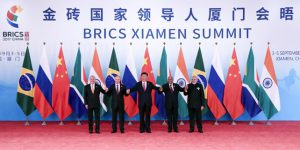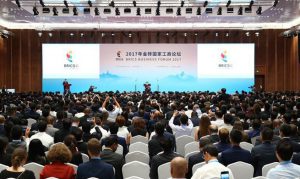Asia – Pacific leaders issue Declaration
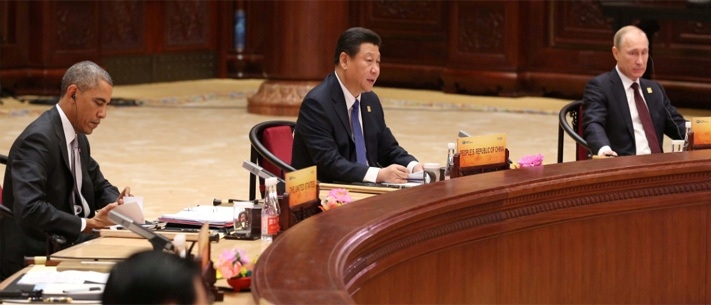
Beijing : The Leaders of the 21 APEC member economies concluded their meeting at Yanqi Lake on November 11 by issuing the 22nd APEC Economic Leaders’ Meeting Declaration – Beijing Agenda for an Integrated, Innovative and Interconnected Asia-Pacific.
The Declaration outlines new far-reaching measures for advancing regional economic integration, promoting innovative development, economic reform and growth, and strengthening comprehensive connectivity and infrastructure development, with a view to expanding and deepening regional economic cooperation, and attaining peace, stability, development and common prosperity of the Asia-Pacific.
President Xi Jinping of China in an address at the opening cermony of the summit outlined actions that leaders will consider to advance regional economic integration, promote innovative development, economic reform and growth, and strengthen comprehensive connectivity and infrastructure development priority areas of APEC collaboration during China’s year as Chair.
Likewise , China and the US have unveiled new pledges on greenhouse gas emissions, as the leaders of the two countries met for talks in Beijing.US President Barack Obama said the move was “historic”, as he set a new goal of reducing US levels between 26%-28% by 2025, compared with 2005 levels.China did not set a specific target, but said emissions would peak by 2030.
The 22nd APEC Ecomomic Leaders’ Declaration – Beijing Agenda for an Integrated, Innovative and Interconnected Asia-Pacific
” We, the APEC Leaders, gathered by Yanqi Lake in Beijing for the 22nd APEC Economic Leaders’ Meeting. Under the theme of “Shaping the Future through Asia-Pacific Partnership”, we held substantial discussions on the priorities of advancing regional economic integration, promoting innovative development, economic reform and growth, and strengthening comprehensive connectivity and infrastructure development with a view to expanding and deepening Asia-Pacific regional economic cooperation, and attaining peace, stability, development and common prosperity of the Asia-Pacific.
The Asia-Pacific region has experienced a quarter of a century’s growth and development. APEC has not only made significant contributions to the region’s economic development, social progress and improvement of people’s livelihoods, but has also epitomized the great changes and rising strategic position of the Asia-Pacific. Through its unique approach featuring voluntary action, consensus, flexibility and pragmatism, APEC has successfully established a sound regional economic cooperation framework among member economies with remarkable diversity and at different stages of development. Adhering to the spirit of unity, mutual respect and trust, mutual assistance and win-win cooperation, we have been working to narrow the development gap among ourselves and have consistently promoted the robust, sustainable, balanced, inclusive and secure growth in the Asia-Pacific region and beyond.
After years of rapid development, the Asia-Pacific has become the most dynamic region of the world, and has never been as important as it is today in the global landscape. At present, the Asia-Pacific maintains a strong momentum of growth; it possesses an enormous potential and has a bright future. Yet it is also faced with risks and challenges.
We are at an important historical moment of building on past achievements and striving for new progress. We are committed to working together to shape the future through Asia-Pacific partnership, building an open economy in the Asia-Pacific featuring innovative development, interconnected growth, and shared interests, and consolidating the leading role of the Asia-Pacific in the world economy, with a goal of opening up new prospects for future cooperation and achieving common prosperity in the Asia-Pacific region.
To achieve the above-mentioned goals, we pledge to take the following actions:
I. Advancing Regional Economic Integration
Pursuing Free and Open Trade and Investment
We reiterate the value, centrality and primacy of the multilateral trading system in promoting trade expansion, economic growth, job creation and sustainable development. We stand firmly together to strengthen therules-based, transparent, non-discriminatory, open and inclusive multilateral trading system as embodied in the WTO.
We express our grave concern regarding the impasse in the implementation of the Trade Facilitation Agreement (TFA) which has resulted in stalemate and uncertainties over other Bali decisions. These developments have affected the credibility of the WTO negotiating function. In finding solutions to the implementation of the Bali decisions, APEC will exert creative leadership and energy together with all WTO members in unlocking this impasse, putting all Bali decisions back on track, and proceeding with the formulation of Post-Bali Work Program, as a key stepping stone to concluding the Doha Round.
We reaffirm our pledges against all forms of protectionism. We extend our standstill commitment through the end of 2018 and reaffirm our commitment to roll back protectionist and trade-distorting measures. We remain committed to exercise maximum restraint in implementing measures that may be consistent with WTO provisions but have a significant protectionist effect, and to promptly rectifying such measures, where implemented.
We acknowledge that bilateral, regional and plurilateral trade agreements can play an important role in complementing global trade liberalization initiatives. We will continue to work together to ensure that they contribute to strengthening the multilateral trading system. We underscore the importance of the negotiations to expand the product coverage of the Information Technology Agreement (ITA). A final ITA expansion outcome should be commercially significant, credible, pragmatic, balanced, and reflective of the dynamic technological developments in the information technology sector over the last 17 years, and contribute to the multilateral trading system. We welcome APEC’s leadership in advancing the negotiations and call for swift resumption and conclusion of plurilateral negotiations in Geneva. We welcome the launch of negotiations on Environmental Goods Agreement (EGA) in July 2014 in Geneva. We encourage participants of the above initiatives to seek expanded memberships.
We welcome the significant progress made toward achieving the Bogor Goals. We will make every effort to achieve the Bogor Goals by 2020. We also welcome the biennial Bogor Goals review this year. We urge all economies, particularly developed ones to deeply consider the conclusions of the Report on APEC’s 2010 Economies’ Progress towards the Bogor Goals and the 2012 and 2014 Bogor Goals Progress Report, and to take more concrete actions towards attaining the Bogor Goals.
Recognizing APEC has a critical role to play in shaping and nurturing regional economic integration, we agree that APEC shouldmake more important and meaningful contributions as an incubator to translate the Free Trade Area of the Asia-Pacific (FTAAP) from a vision to reality. We reaffirm our commitment to the eventual FTAAP as a major instrument to further APEC’s regional economic integration agenda.
In this regard, we decide to kick off and advance the process in a comprehensive and systematic manner towards the eventual realization of the FTAAP, and endorse the Beijing Roadmap for APEC’s Contribution to the Realization of the FTAAP (Annex A). Through the implementation of this Roadmap, we decide to accelerate our efforts on realizing the FTAAP on the basis of the conclusion of the ongoing pathways, and affirm our commitment to the eventual realization of the FTAAP as early as possible by building on ongoing regional undertakings, which will contribute significantly to regional economic integration, sustained growth and common prosperity in the Asia-Pacific region. We instruct Ministers and officials to undertake the specific actions and report the outcomes to track the achievements.
We welcome the establishment of a Committee on Trade and Investment (CTI) Friends of the Chair Group on Strengthening Regional Economic Integration (REI) and Advancing FTAAP, and urge the Friends of the Chair Group to continue its work. We agree to launch a collective strategic study on issues related to the realization of the FTAAP, and instruct officials to undertake the study, consult stakeholders and report the result by the end of 2016.
We endorse the establishment of an APEC Information Sharing Mechanism on RTAs/FTAs. We highly commend the work on the implementation of the Action Plan Framework on Capacity Building Needs Initiatives (CBNI), and endorse the Action Plan Framework of the 2nd CBNI. We instruct officials to design targeted and tailor-made capacity building activities to narrow the gap of the capacities of APEC economies to facilitate the eventual realization of the FTAAP.
In addition to the above, we reaffirm the role of APEC in addressing next generation trade and investment issues and sectoral initiatives, and agree to accelerate “at the border” trade liberalization and facilitation efforts, improve the business environment “behind the border”, and enhance regional connectivity “across the border” to accumulate more building blocks for the realization of the FTAAP. Therefore, we:
— reaffirm our commitment to reduce applied tariffs to five percent or less by the end of 2015 on the list of environmental goods that we endorsed in 2012 in Vladivostok. We call upon all economies to redouble their efforts in order to realize the economic and environmental benefits. We will instruct officials to report progress in achieving this ground-breaking commitment at our meeting next year in the Philippines. We welcome the work on capacity building on Environmental Goods (EGs) commitment implementation;
— welcome the inaugural meeting of the APEC Public Private Partnership on Environmental Goods and Services (PPEGS) on renewable and clean energy trade and investment, and endorse the APEC Statement on Promoting Renewable and Clean Energy (RCE) Trade and Investment;
— welcome the progress onexploring products which could contribute to sustainable and inclusive growth as part of our concrete commitment to rural development and poverty alleviation;
— endorse the Action Agenda on Promoting Infrastructure Investment through Public-Private Partnership (PPP) and instruct officials to take concrete actions to strengthen cooperation on PPP to promote more robust and sustainable infrastructure investment and development in the APEC region;
— welcome the Case Studies on Sustainable Investment in the APEC Region and encourage officials to consider and draw experience and good practices from the nominated cases to promote sustainable cross-border investment;
— endorse the APEC Cross Border E-Commerce Innovation and Development Initiative and encourage economies to designate or establish Research Centers of Cross-border E-commerce Innovation and Development on a voluntary basis;
— recognize that the effective protection and enforcement of IPR including trade secrets incentivizes and facilitates innovation and foreign direct investment and the dissemination of technology through licensing and partnerships;
— endorse the APEC Action Agenda on Advertising Standards and Practice Development to promote alignment of advertising standards and reduce the cost of doing business across the region;
— endorse the Asia-Pacific Region Automotive Industry Sustainable Development Declaration and welcome the outcomes of the 2014 APEC Regulatory Cooperation Advancement Mechanism (ARCAM) Dialogue on Electric Vehicle Standards. We welcome the APEC Actions to Promote the Widespread Usage of Electric Vehicles.
Advancing Global Value Chain Development and Supply Chain Connectivity
Recognizing that Global Value Chains (GVCs) have become a dominant feature of the global economy and offer new prospects for growth, competitiveness and job creation for APEC economies at all levels of development, we endorse the APEC Strategic Blueprint for Promoting Global Value Chain Development and Cooperation (Annex B). We welcome the progress made in the measurement of Trade in Value Added (TiVA), services, SMEs and GVCs resilience, etc., and instruct officials to advance the work through the CTI Friends of the Chair Group on GVC to put forward new initiatives under the Strategic Blueprint in 2015 and beyond.
We endorse the Strategic Framework on Measurement of APEC TiVA under GVCs and the Action Plan on this Strategic Framework. We instruct the newly-formed technical group to work closely with the WTO, OECD, the World Bank, UNCTAD and other related international organizations, with an aim to complete the construction of the APEC TiVA Database by 2018.
We endorse the Terms of Reference of Promoting SME’s Integration into GVCs, and welcome the launch of the related activities. We instruct officials to make efforts in advancing this work.
We welcome the commitment of APEC economies to move forward with the implementation of the WTO Trade Facilitation Agreement, including the notification by many APEC developing economies of their category A TFA obligations. We welcome, as well, the progress this year in improving the performance of APEC supply chains through targeted, focused capacity building and technical assistance. In this regard, we applaud the establishment of the APEC Alliance for Supply Chain Connectivity, which will contribute to our goal in achieving a ten percent improvement of supply chain performance by the end of 2015 and our broader supply chain connectivity objectives. We encourage economies to increase the resources of the APEC Supply Chain Connectivity Sub-Fund to ensure that our capacity building and technical assistance projects succeed to meet our ten percent performance improvement goal and to further our trade facilitation objectives.
We agree to establish the Asia-Pacific Model E-port Network (APMEN) and welcome the first batch of APEC Model E-ports nominated by the APEC economies. We endorse the Terms of Reference of the APMEN and agree to set up the APMEN operational center in the Shanghai Model E-port, and instruct officials to make further efforts to contribute to regional trade facilitation and supply chain connectivity.
We positively value the APEC High-level Roundtable on Green Development and its declaration, and agree to establish the APEC Cooperation Network on Green Supply Chain. We endorse the establishment of the first pilot center of APEC Cooperation Network on Green Supply Chain in Tianjin, China, and encourage other economics to establish the pilot centers and advance related work actively.
We endorse the APEC Customs 3M (Mutual Recognition of Control, Mutual Assistance of Enforcement and Mutual Sharing of Information) Strategic Framework. We instruct officials to further simplify and coordinate APEC customs procedures based on the 3M Framework to facilitate the development of regional trade. We encourage APEC members’ customs authorities to continue strengthening cooperation and coordination in pursuit of the 3M vision, to push forward comprehensive connectivity and make greater contributions to the sustainable development of trade and regional economic integration in the Asia-Pacific region.
We recognize that the use of standardized codes will enable information about traded goods to be easily understood and shared by all parties. We therefore encourage APEC economies to work with the private sector to promote further cooperation on global data standards and their wider use by developing pilot projects.
We welcome the initiative on manufacturing related services in supply chains/value chains as a next generation trade and investment issue, and instruct officials to develop a plan of action in 2015.
Strengthening Economic and Technical Cooperation
We endorse the APEC Strategic Plan on Capacity Building to Promote Trade and Investment Agenda which adopts a strategic, goal-oriented and multi-year approach. We instruct officials to take the Strategic Plan as a guide to develop and implement more tailor-made capacity building programs that contribute to the core trade and investment liberalization and facilitation agenda of APEC.
We encourage economies, particularly developed economies, to provide more contributions to ECOTECH and capacity building, to achieve our goal of bridging development gaps, and help member economies to meet their APEC commitments and their economic growth objectives.
We welcome the initiative to upgrade the Asia Pacific Finance and Development Center (AFDC) to the Asia Pacific Finance and Development Institute (AFDI).
II. Promoting Innovative Development, Economic Reform and Growth
We realize that the prospects for the shared prosperity of APEC will depend on innovative development, economic reform and growth in the region, which are complementary and mutually reinforcing. We recognize that the Asia-Pacific region is at a crucial stage of economic transformation. We are committed to accelerating the pace of reform and innovation, and exploring new growth areas with the goal of bolstering the position of the Asia-Pacific as an engine for world economic growth. We agree to strengthen macroeconomic policy coordination with a view to forging policy synergy, and creating a sound policy environment for the robust, sustainable, balanced and inclusive economic growth in the region.
We endorse the APEC Accord on Innovative Development, Economic Reform and Growth (Annex C) which identifies Economic Reform, New Economy, Innovative Growth, Inclusive Support and Urbanization as the five pillars for promoting experience sharing, policy dialogue, capacity building and practical cooperation.
Economic Reform
To advance APEC’s economic reform agenda, we agree to hold the 2nd Ministerial Meeting on Structural Reform in 2015. Recognizing that many APEC developing economies are facing the challenge of the Middle-Income Trap (MIT), we agree to incorporate the issue of overcoming the MIT into the work program of the APEC Economic Committee.
To meet our objective of strengthening the implementation of good regulatory practices, we will further enhance communication, exchanges, and sharing of experiences, and foster anopen and transparentregulatory environment in our economies, according to individual economies’ needs and circumstances. We will endeavor to take new actions through the use of information technology and the Internet to improve our conduct of public consultations on proposed regulations.
We recognize the role of internationally recognized private international law instruments such as the Hague Conventions in facilitating cross-border trade and investment, enhancing ease of doing business, and fostering effective enforcement of contracts and efficient settlement of business disputes. We encourage wider use of these instruments which would contribute to APEC’s regional integration, connectivity and structural reform agenda.
New Economy
We recognize that New Economy represents the trend of economic growth and sustainable development in the Asia-Pacific region and beyond. We support the efforts to promote economic restructuring and upgrading in traditional industries, explore new and promising economic growth areas such as the Green Economy, the Blue Economy, and the Internet Economy, and promote green, circular, low-carbon and energy-efficient development.
We are encouraged by the progress of APEC’s ocean-related cooperation and welcome the Xiamen Declaration issued at the 4th APEC Oceans Ministerial Meeting this year, and instruct our Ministers and officials to fully implement the Declaration. We acknowledge the Xiamen Declaration’s statement on the Blue Economy. We welcome the APEC Marine Sustainable Development Report. We encourage the Ocean and Fisheries Working Group to work with APEC fora to advance Blue Economy cooperation.
We recognize the role of the Internet Economy in promoting innovative development and empowering economic participation. We endorse the APEC Initiative of Cooperation to Promote the Internet Economy and instruct Ministers and officials to discuss the Internet Economy further, put forward proposals for actions, promote member economies’ cooperation on developing the Internet Economy and facilitate technological and policy exchanges among member economies, taking into account the need to bridge the digital divide.
We welcome the Beijing Declaration ofthe 2014 APEC Energy Ministerial Meeting. We welcome the establishment of the APEC Sustainable Energy Center in China. We recognize the importance of promoting diversified energy supplies, and market-based competition and pricing mechanisms that reflect demand and supply fundamentals as appropriate to each economy. We encourage member economies to take actions to eliminate trade protection and restrictive measures that may impede progress in renewable energy technologies and development of this sector, and we endorse the Energy Ministers’ aspirational goal to double the share of renewables including in power generation by 2030 in APEC’s energy mix. We affirm our commitment to rationalize and phase out inefficient fossil fuel subsidies that encourage wasteful consumption while still providing essential energy services. We acknowledge Peru and New Zealand for initiatingvoluntary peer reviews in 2014 of inefficient fossil fuel subsidies that cause wasteful consumption and sharing their best practices, and welcome the commitment from the Philippines to undergo a peer review in 2015. We encourage innovation, competition and cooperation to promote a sound and sustainable energy sector in the Asia-Pacific and to ensure its energy security, economic growth, poverty eradication and an appropriate response to climate change.
We emphasize the importance of efforts to ensure sustainable development in mining, including the development, processing, utilization, investment and trade in minerals, metals and related products and welcome Ministers’ views recognizing the important role of the Minamata Convention on Mercury.
We will continue our efforts to protect forest resources, combat illegal logging and associated trade, promote sustainable forest management, and work with relevant organizations, including the Asia-Pacific Network on Sustainable Forest Management and Rehabilitation (APFNet), to ensure the achievement of the aspirational goal on forests in the Sydney Declaration.
We commit to continue our efforts in combating wildlife trafficking. We will take steps to combat wildlife trafficking by enhancing international cooperation through Wildlife Enforcement Networks (WENs) and other existing mechanisms, reducing the supply of and demand for illegally traded wildlife, increasing public awareness and education related to wildlife trafficking and its impacts, and treating wildlife trafficking crimes seriously.
Innovative Growth
We recognize innovation as an important lever for economic growth and structural reform. We endorse the initiative on Toward Innovation-Driven Development. We commit to foster a pragmatic, efficient and vigorous partnership on science, technology and innovation. We agree to strengthen collaboration amongst government, academia, and private sector stakeholders to build science capacity, to promote an enabling environment for innovation andincluding by establishing training centers for the commercialization of research, and to enhance regional science and technology connectivity, with respect for intellectual property rights and trade secrets.
We welcome the Nanjing Declaration on Promoting SMEs Innovative Development. We commit to strengthen our support, and provide an enabling environment for SMEs in innovation activities. We welcome efforts to strengthenSMEs’ cooperation in the Asia-Pacific region, involve SMEs in APEC production and supply chains, promote ethical business practices, as well as to empowertheir capacity to operate in an international market. We welcome member economies’ joint efforts and contribution to promote the APEC Accelerator Network and to invest in the early stage development of innovative SMEs.
Inclusive support
We recognize that inclusive support is essential to maintain growth and to deal with risks and potential fallout of reform, with an aim to provide a solid foundation for economic growth and to address the needs of vulnerable groups. We welcome the outcomes of the 6th Human Resources Development Ministerial Meeting and theAction Plan (2015-2018) on Promoting Quality Employment and Strengthening People-to-People Connectivity through Human Resources Development. We encourage APEC economies to give priority to stabilizing and expanding employment, implementing macroeconomic policies in favor of job creation, and strengthening capacity building for human resources development, vocational skills development and skill training for youth. We commend the 10-year achievement of the APEC Digital Opportunity Center initiative through our joint efforts and cooperation in bridging digital divides, strengthening human resource development and creating digital opportunities throughout the APEC region.
We recognize the pivotal role of women in the development and prosperity of the Asia-Pacific, and are committed to taking concrete policies and innovative measures to further enhance women’s economic empowerment and their access to markets and ICT technology, eliminate all barriers that hinder women’s economic participation, and ensure women’s equal opportunities, participation and benefit in innovative development, economic reform and growth. We welcome the recommendations from the Women and the Economy Forum, and commit to promote women entrepreneurship.
e recognize the importance of data to measure progress in reducing barriers to women’s economic participation, and we welcome the establishment of the APEC Women and the Economy Dashboard as a tool to inform policy discussions. We support women’s leadership and recognize the importance of women’s entrepreneurship support services and networks. We encourage the formal development of an APEC-wide women’s entrepreneurship network to empower women entrepreneurs to start and grow businesses and increase their access to domestic and international markets.
We welcome recommendations from the 4th High Level Meeting on Health and the Economy and endorse the “Healthy Asia-Pacific 2020” initiative, which aims to achieve sustainable and high-performing health systems that will ensure people’s health, including physical and mental well-being, through the whole life-course by means of a whole-of-government, and whole-of-society approach with the collaboration of the entire Asia-Pacific region.
We commit to jointly tackle pandemic diseases, terrorism, natural disasters, climate change and other global challenges. In confronting the currentEbola Virus Disease epidemic, we are determined to intensify our cooperation and work shoulder to shoulder with African nations to help them effectively end this epidemic and prevent, detect, manage and respond to future outbreaks. We will continue to assistpeople in affected areas to overcome this crisis and build back their economiesso we can win the battle against the disease.
We endorse the Beijing Declaration on APEC Food Security issued at the Third APEC Ministerial Meeting on Food Security. We welcome APEC Action Plan for Reducing Food Loss and Waste, the APEC Food Security Business Plan (2014-2020), and the APEC Food Security Roadmap toward 2020 (2014 version) and the Action Plan to Enhance Connectivity of APEC Food Standards and Safety Assurance.We note the G20’s work on food security in 2014. We call on APEC economies to seek common ground to build an open, inclusive, mutually-beneficial and all-win partnership for the long-term food security of the Asia-Pacific region. We will strengthen APEC agricultural science and technology innovation and cooperation to advance sustainable agricultural development and support sustainable fisheries.
We commend the ongoing efforts of the APEC Food Safety Cooperation Forum (FSCF) and its Partnership Training Institute Network (PTIN), which will help ensure the safety of food produced and traded in the APEC region by improving food safety regulatory systems, encouraging harmonization with international science-based standards, building capacity in areas that will facilitate trade, and enhancing communication and collaboration between industry and regulators to address emerging food safety issues. We welcome the APEC Food Safety Beijing Statement of the 2014 APEC High-Level Regulator Industry Dialogue on Food Safety.
We commend the strong resolve shown in fighting corruption,including through effectiveanti-corruption measures. We support the Beijing Declaration on Fighting Corruption and welcome the APEC Principles on the Prevention of Bribery and Enforcement of Anti-Bribery Laws, and APEC General Elements of Effective Voluntary Corporate Compliance Programs. We commit to work together against corruption and deny safe haven for corrupt officials and their illicitly-acquired assets. We are committed to strengthening cooperation and coordination on repatriation or extradition of corrupt officials as well as confiscation and recovery of corruption proceeds, and where appropriate, through the use of anti-corruption mechanisms and platforms such as the APEC Network of Anti-Corruption and Law Enforcement Agencies (ACT-NET).
We encourage further cooperation of member economies in disaster preparedness, risk reduction, response and post-disaster recovery, and cooperation in search and rescue, including through more robust networking among disaster management departments; following the APEC Guidelines on Appropriate Donations; improving supply chain resiliency; operationalizing the Trade Recovery Programme, reducing barriers to the movement of emergency responders and humanitarian relief across borders; increased data sharing; and application of science and technologies.
We reiterate our resolve to create a secure and resilient environment for economic activities and connectivity in the APEC region and continue concerted efforts to implement the APEC Consolidated Counter-Terrorism and Secure Trade Strategy.
Urbanization
We recognize that the Asia-Pacific is currently experiencing booming urbanization. We realize that sustained and healthy development of urbanization is conducive to promoting innovative growth and realizing robust, inclusive and sustainable development in the Asia-Pacific.
We commend the constructive work undertaken by APEC this year in promoting urbanization cooperation in the Asia-Pacific region, and endorse the APEC Cooperation Initiative for Jointly Establishing an Asia-Pacific Urbanization Partnership.
Recognizing the range of urbanization challenges and opportunities across APEC economies, we commit to collectively promote cooperation projects, and to further explore pathways to a new-type of urbanization and sustainable city development, featuring green,energy efficient, low-carbon and people-orientation.
III. Strengthening Comprehensive Connectivity and Infrastructure Development
We recognize that strengthening comprehensive connectivity and infrastructure development will help open up new sources of economic growth, promote cooperation and mutual assistance, and advance prosperity and the spirit of community in the Asia-Pacific region. We commend the achievements already made by APEC in connectivity and infrastructure development cooperation.
We endorse the APEC Connectivity Blueprint for 2015-2025 (Annex D). We are committed to implementing the APEC Connectivity Blueprint and achieving the overarching goal of strengthening physical, institutional and people-to-people connectivity by taking agreed actions and meeting agreed targets by 2025, with the objective of achieving a seamless and comprehensively connected and integrated Asia Pacific.
We commit to solve the financing bottleneck of infrastructure development. We commend the work and progress accomplished under the APEC Finance Ministers’ Process (FMP) in infrastructure investment and financing cooperation. We recognize, in particular, efforts in promoting PPP on Infrastructure, such as compiling demonstrative infrastructure PPP projects, advancing the work of the PPP Experts Advisory Panel, strengthening capacity building of Indonesia’s Pilot PPP Center, and carrying on capacity building project of PPP pilot demonstration and standard contract making. We welcome the Implementation Roadmap to Develop Successful Infrastructure PPP Projects in the APEC Region to guide APEC’s future work in this aspect. We welcome the establishment of the PPP Center in China as a center of excellence.
We encourage member economies to strengthen energy infrastructural development and connectivity, such as oil and natural gas pipelines and transmission networks, LNG terminals, smart grids and distributed energy systems on the basis of shared interest and mutual benefit.
We encourage all member economies to take effective measures to promote the mobility of business personnel, tourists, researchers, students and labor in the region.
We support initiatives and activities that further enhance the three dimensions of cross-border education cooperation found in the 2012 LeadersDeclaration– mobility of students, researchers, and providers. We applaud the work that has been accomplishedthis year, including the establishment of the APEC Higher Education Research Center (AHERC); contributions to the APEC scholarships and internships initiative, which will encourage people-to-people exchange in our region; and promotion of virtualacademic mobility by leveraging internet-based resources and innovative learning practices.
We support the target set at the 8th APEC Tourism Ministers’ Meeting of making efforts to receive 800 million international tourist arrivals in APEC economies by 2025.
We appreciatethe initiatives which will greatly improve connectivity and infrastructure in the Asia-Pacific region, help resolve the bottleneck of financing in this field, and promote regional economic integration and the common development of the Asia-Pacific.
IV. Looking Forward
With joint efforts of member economies, the Asia-Pacific has become the most dynamic region of the world with enormous growth potential. Never before has the world been more in need of a harmonious, stable and prosperous Asia-Pacific. We commit to working together to shape the future through Asia-Pacific partnership in the spirit of mutual respect and trust, inclusiveness, and win-win cooperation, and making a contribution to the long-term development and common prosperity of the region.
We commit to carry forward APEC reform, improve its cooperation mechanisms, and implement ambitious goals and blueprints, with the aim of enabling APEC to play a more active coordinating and leading role in the Asia-Pacific.
We commend the constructive role of the APEC Business Advisory Council (ABAC) in strengthening public-private partnership and promoting APEC cooperation in various fields.
We are committed to enhancing APEC synergy with other relevant international and regional cooperation organizations and fora through coordination and cooperation, as well asenabling APEC to play an increasingly important role in the global governance system.
We are satisfied with the positive, meaningful and fruitful achievements of this meeting and appreciate China’s tremendous and fruitful efforts to successfully host this meeting.
We are committed to supporting future hosts of APEC, including Peru, Viet Nam, Papua New Guinea, Chile, Malaysia, New Zealand and Thailand who are to host APEC in the years of 2016, 2017, 2018, 2019, 2020, 2021 and 2022 respectively.
We look forward to convening again during the Philippines’ hosting of APEC in 2015.
Annex A: the Beijing Roadmap for APEC’s Contribution to the Realization of the FTAAP
Annex B: APEC Strategic Blueprint for Promoting Global Value Chain Development and Cooperation
Annex C: APEC Accord on Innovative Development, Economic Reform and Growth
Annex D: APEC Connectivity Blueprint for 2015-2025 “
Source : APEC
November 11 , 2014


